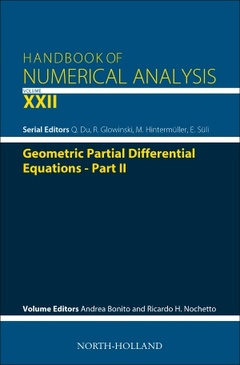Description
Geometric Partial Differential Equations - Part 2
Handbook of Numerical Analysis Series
Coordinators: Bonito Andrea, Nochetto Ricardo Horacio
Language: English
Subject for Geometric Partial Differential Equations - Part 2:
570 p. · 15x22.8 cm · Hardback
Description
/li>Contents
/li>Readership
/li>Biography
/li>Comment
/li>
Besides their intrinsic mathematical interest, geometric partial differential equations (PDEs) are ubiquitous in many scientific, engineering and industrial applications. They represent an intellectual challenge and have received a great deal of attention recently. The purpose of this volume is to provide a missing reference consisting of self-contained and comprehensive presentations. It includes basic ideas, analysis and applications of state-of-the-art fundamental algorithms for the approximation of geometric PDEs together with their impacts in a variety of fields within mathematics, science, and engineering.
1. Shape and topology optimization Grégoire Allaire, Charles Dapogny, and François Jouve
2. Optimal transport: discretization and algorithms Quentin Mérigot and Boris Thibert
3. Optimal control of geometric partial differential equations Michael Hintermüller and Tobias Keil
4. Lagrangian schemes for Wasserstein gradient flows Jose A. Carrillo, Daniel Matthes, and Marie-Therese Wolfram
5. The Q-tensor model with uniaxial constraint Juan Pablo Borthagaray and Shawn W. Walker
6. Approximating the total variation with finite differences or finite elements Antonin Chambolle and Thomas Pock
7. Numerical simulation and benchmarking of drops and bubbles Stefan Turek and Otto Mierka
8. Smooth multi-patch discretizations in isogeometric analysis Thomas J.R. Hughes, Giancarlo Sangalli, Thomas Takacs, and Deepesh Toshniwal
The targeted audience is mathematically trained research scientists and engineers with basic knowledge in partial differential equations and their numerical approximations.
Together with Ricardo H. Nochetto they have more than forty years of experience in the variational formulation and approximation of a wide range of geometric partial differential equations (PDEs). Their work encompass fundamental studies of numerical PDEs: the design, analysis and implementation of efficient numerical algorithms for the approximation of PDEs; and their applications in modern engineering, science, and bio-medical problems.
Ricardo H. Nochetto is professor in the Department of Mathematics and the Institute for Physical Science and Technology at the University of Maryland, College Park.
Together with Andrea Bonito they have more than forty years of experience in the variational formulation and approximation of a wide range of geometric partial differential equations (PDEs). Their work encompass fundamental studies of numerical PDEs: the design, analysis and implementation of efficient numerical algorithms for the approximation of PDEs; and their applications in modern engineering, science, and bio-medical problems.
- About every aspect of computational geometric PDEs is discussed in this and a companion volume. Topics in this volume include stationary and time-dependent surface PDEs for geometric flows, large deformations of nonlinearly geometric plates and rods, level set and phase field methods and applications, free boundary problems, discrete Riemannian calculus and morphing, fully nonlinear PDEs including Monge-Ampere equations, and PDE constrained optimization
- Each chapter is a complete essay at the research level but accessible to junior researchers and students. The intent is to provide a comprehensive description of algorithms and their analysis for a specific geometric PDE class, starting from basic concepts and concluding with interesting applications. Each chapter is thus useful as an introduction to a research area as well as a teaching resource, and provides numerous pointers to the literature for further reading
- The authors of each chapter are world leaders in their field of expertise and skillful writers. This book is thus meant to provide an invaluable, readable and enjoyable account of computational geometric PDEs



